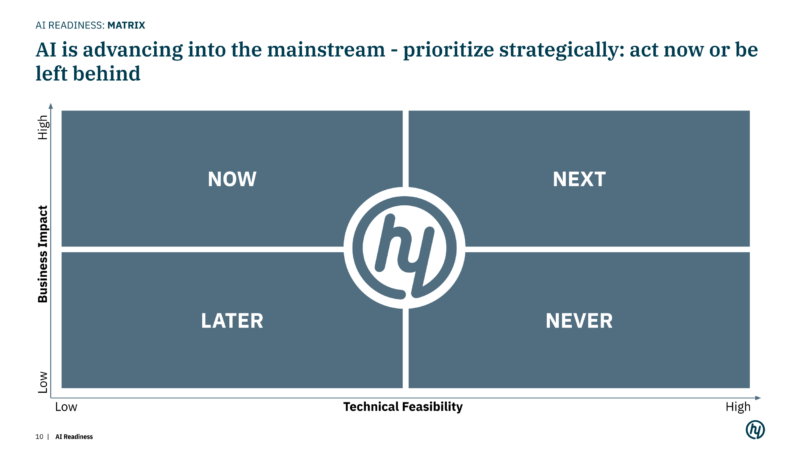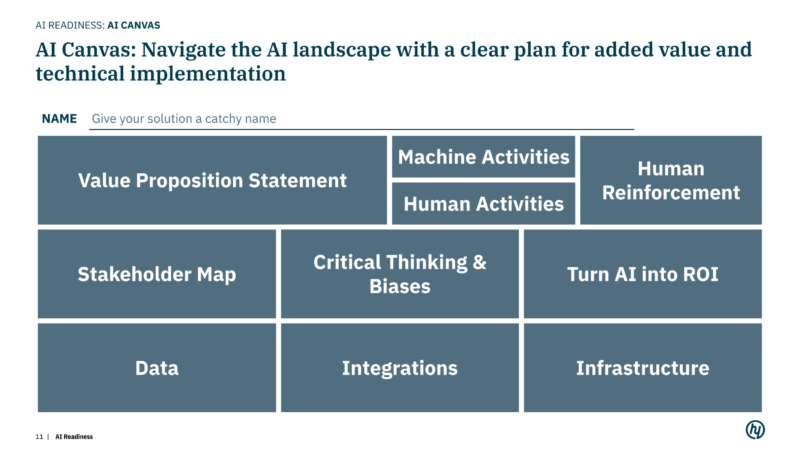From Trend to Opportunity: How AI Can Propel Your Business Forward

In an era where Artificial Intelligence (AI) has evolved from a technological trend to a strategic necessity, “AI Readiness” significantly determines a company’s success. It measures an organization’s capability, especially in the SME sector, to integrate and utilize AI. The rapid development of AI technologies and decreasing entry barriers present vast opportunities for efficiency enhancement, cost reduction, and innovation. Simultaneously, the pressure to adopt these technologies increases to remain competitive.
Our article offers practical recommendations for executives and decision-makers in SMEs on clearly defining goals, early activation of employees, a structured approach to identifying suitable use cases, and enhancing AI Readiness. The AI Readiness Assessment helps companies evaluate their position, discover potential, and design a tailored plan for AI implementation. Through practical examples and proven tools like the AI Canvas, we demonstrate how companies can effectively improve their AI readiness. The time to act is now!

1. Are You Being Left Behind? – The train is leaving the station
AI is no longer a fringe phenomenon but is at the heart of strategic focus areas for companies worldwide. The ongoing digitalization and technological advancement make engaging with AI unavoidable. It’s not just about understanding AI as a tool but about creating the conditions for successful implementation immediately after selecting suitable use cases to fully exploit AI’s opportunities while addressing its challenges.
Despite a sector-wide downturn in financing activities affecting Corporate Venture Capital (CVC) investments in AI and tech startups after a peak in 2021, the increase from $7.43 billion in 2019 to $12.46 billion in 2023 underscores the ongoing significance of AI technologies as drivers for innovation and competitive advantage (see chart). In a world where technological innovations develop at a breathtaking pace, the fear of being left behind is real. AI is advancing rapidly, and the barriers to its use are continually lowering. This presents remarkable opportunities for businesses but also risks falling behind. Large corporations that invest early in AI set standards and shape market expectations. A look at leading companies shows: AI is becoming the new standard for technology-driven innovations. The AI train is already in full motion. Against this backdrop, actively shaping this transformation is imperative to generate sustainable positive effects and long-term advantages.

2. Aligning AI with Corporate Goals
Despite the current challenging economic climate, which has slowed down digital transformation, SMEs see AI systems as a key to efficiency improvement, productivity enhancement, and cost reduction. By automating complex business processes, enabling data-driven decision-making in production and finance, and providing personalized customer experiences, AI directly addresses current challenges. Solutions with quick return on investment and a significant impact on operating results that seamlessly integrate into the company strategy are in high demand. The backbone of the German economy, the SME sector, thus focuses on AI applications that show immediate effects in 2024, rather than on long-term innovation projects with uncertain outcomes.
Our AI projects this year also show that the key to successful AI deployment in companies lies in strategic alignment: use cases must contribute real value to gain early management commitment and shed light on the crucial “why.” AI, among many other technologies, is a means to an end, a strategic tool used specifically to solve concrete business problems and achieve specific goals. Every successful AI transformation starts with clearly defined goals that guide the selection of use cases from the beginning and ensure that each initiative supports the company strategy.
Based on a clearly articulated strategy with measurable goals, the activation of employees, AI Discovery, and an AI Readiness Assessment follow.
3. Activating and Early Involvement of Employees
The success of AI initiatives in companies does not solely depend on the clear definition of strategic goals but also requires the early involvement and active participation of employees. Creative workshops provide an effective, pragmatic, and cost-efficient training and development opportunity. They make theoretical knowledge accessible, but also tangible and understandable the potentials and limitations of AI, thereby sensitizing the workforce to the upcoming digital transformation. We recommend not missing out on the following key elements:
Experience and practical relevance: Workshops that go beyond theory and make technology tangible for participants through the use of (Generative) AI in practical exercises are particularly effective. This direct experience with AI tools not only highlights the diverse applications but also confronts employees with the current limitations.
Case studies and best practices: Presenting successful AI deployments in similar industries or business functions serves as a source of inspiration and illustrates how AI can enhance process efficiency, employee productivity, and reduce costs. Such concrete examples demonstrate the technical feasibility and practical relevance of AI, strengthening motivation to actively engage with the technology.
Discussion and reflection: Open discussions with employees about the potentials and challenges of AI, including legal and ethical considerations, are essential. They not only foster a critical awareness but also build trust in the key technology. A comprehensive examination of AI’s impact on the workday – both the positives and potential negatives – centers humans in the midst of “impending” changes and simultaneously shows the possibilities for actively shaping a shared future with AI.
Fostering creativity: Another crucial success factor is awakening the creative potential of employees. By encouraging them to develop innovative approaches for using AI in their daily work areas, not only does technological understanding grow, but so does the motivation to actively use and advance these technologies.
4. Identifying and Prioritizing Use Cases
At the heart of the creative process is AI Discovery, a systematic way to uncover promising AI applications. Focus on a central question: How can AI help us achieve our business or departmental goals? This process starts with a careful review of the strategic corporate or departmental goals set by the management and analyzed by employees.
To find potential AI applications, involved participants must think creatively yet realistically. Brainstorming methods are an effective way to quickly and straightforwardly collect ideas, incorporating employees’ expertise, process knowledge, and practical experience.
Following idea collection, the evaluation and prioritization of suggestions are based on two key criteria: Business Value and Technical Feasibility. Business Value assesses a proposal’s contribution to achieving the set goals, such as cost reduction, efficiency improvement, and customer satisfaction, including both financial and non-financial goals like improving product or service quality. Technical Feasibility examines the effort and costs required for the necessary training and test data preparation, the development or procurement of AI models, and the (cloud) infrastructure. Key considerations include access to high-quality data, the possibility of seamless data integration, the complexity from the necessary human oversight to ensure quality, fairness, and transparency, and compliance with ethical and legal requirements.

An objective evaluation of these criteria leads to the identification of the most promising AI projects, promising high business value and technical feasibility. Immediately after prioritization, it’s advisable to capture essential requirements and specific details using the AI Canvas for developing or purchasing the AI solution. The AI Canvas acts as a standardized tool for defining technical, legal, and business requirements of AI initiatives. By systematically recording core aspects like the value proposition, required AI activities, and human oversight, as well as stakeholder concerns and ethical considerations, it ensures a comprehensive view of the upcoming AI project. Key aspects like data requirements, integrations, and infrastructure are precisely mapped out to establish technical specifications and identify potential risks early on.

5. Creating Preconditions and Developing a Roadmap
And now, should companies immediately start with the implementation? Before beginning the implementation of selected AI initiatives, it’s crucial to understand the current state. Here, the AI Readiness Assessment comes into play – an indispensable tool for evaluating a company’s maturity level concerning AI and establishing a foundation for its successful implementation.
The AI Readiness Assessment provides a comprehensive overview of how well a company is prepared for the introduction and use of AI. By assessing various dimensions such as strategy and vision, organization and culture, tools and frameworks, law and ethics, data and system management, and infrastructure, as well as skills and capabilities, the assessment enables a thorough analysis of the current preconditions. This structured evaluation helps companies recognize their strengths and identify areas where improvements are necessary to create the conditions for the full performance of AI systems.

An effective analysis guides companies through a process that not only reveals the current maturity level but also offers tailored recommendations for action. By identifying gaps between the current state and the desired state, the analysis develops a clear roadmap.
Moreover, the AI Readiness Assessment promotes a culture of continuous improvement. By conducting it regularly, companies can track their progress, adapt to changing technologies, and ensure that their AI strategies are always up-to-date.
6. The Time is Now – Take the Initiative
The forecast that AI could significantly boost the global Gross Domestic Product (GDP) underscores the enormous potential of this technology. For companies, the need to act and evaluate their AI readiness is now. Conducting an AI Readiness Assessment is a first but crucial step. It provides a solid foundation for systematically understanding, planning, and successfully implementing AI integration into the company strategy. The time to act is now. With a structured approach and the right strategy, companies can seize the diverse opportunities AI offers and secure a decisive competitive advantage.
hy – the Axel Springer Consulting Group offers you innovative formats for activating employees, holistic methods for identifying suitable use cases, and a tailored AI Readiness Assessment to create the necessary conditions for successful AI initiatives. Please feel free to contact us.



